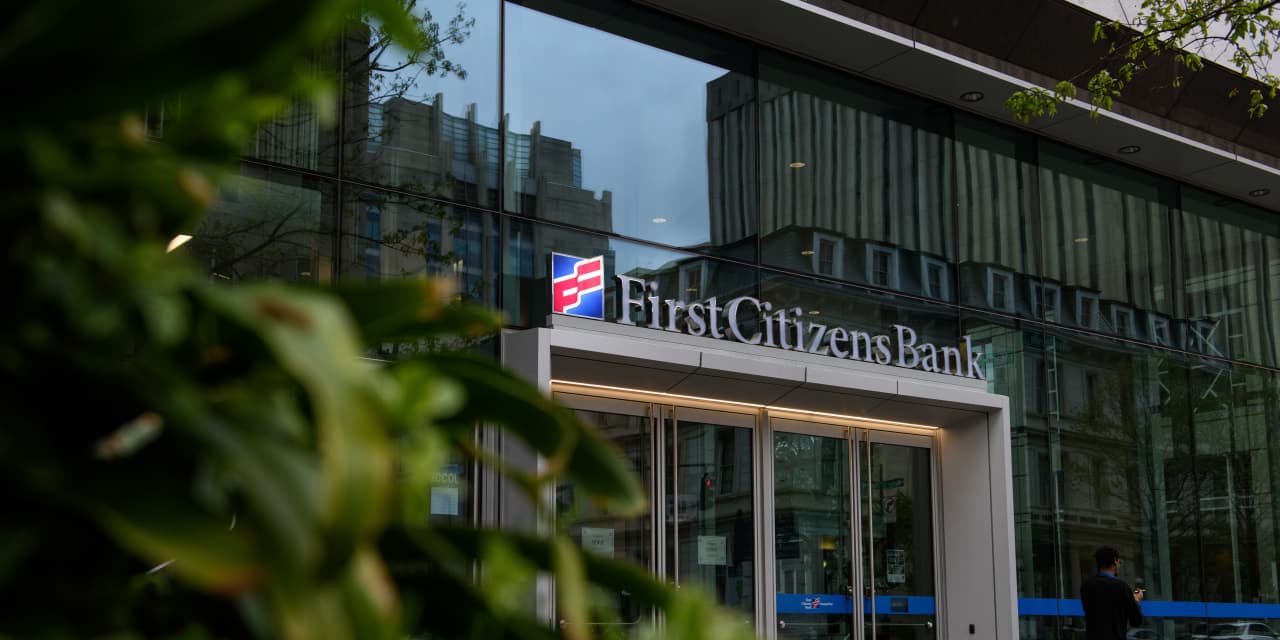First Citizens Bancshares
gained a new bull on Wall Street as the bank continues to integrate failed Silicon Valley Bank into its business.
Analysts at Wedbush Securities initiated coverage of First Citizens (ticker: FCNCA) this week with an Outperform rating and $1,700 price target. This follows a bullish initiation from J.P. Morgan last month.
The Raleigh, N.C.-based bank started to garner more Wall Street coverage nearly two years ago when it acquired CIT Group. It acquired Silicon Valley Bank from the Federal Deposit Insurance Corp in March of this year, leading the bank to quadruple in size over 18 months.
At a time when Wall Street has been bearish on banks, First Citizens is one that seems to garner excitement. Of the 10 analysts surveyed by FactSet who cover the stock, eight have Buy-equivalent ratings, and two are at Hold. Yet the average price target of $1,719.70—nearly 30% above recent trading levels—implies that even those that are less enthusiastic about First Citizens see promise.
The bull case for the bank generally boils down to First Citizens being able to acquire what worked at SVB at attractive terms from the FDIC. So long as there’s a rebound in venture-capital activity—SVB’s specialty—First Citizens is poised to benefit handsomely. But even if troubles in tech persist, analysts still like the bank’s history of solid credit quality, and its successful history with previous acquisitions.
“While there is no guarantee that the SVB acquisition will integrate as planned, we believe that the underlying components of Silicon Valley Bank could be a strong growth driver for years to come in better economic conditions,” David Chiaverini, analyst at Wedbush, wrote Wednesday.
In addition to the story, Chiaverini is sold on First Citizen’s valuation as shares trade at 6.9 times 2024 earnings estimates, slightly lagging peers, which trade around seven times. Shares also trade at just a tick above tangible book value, “which we believe should provide downside support in a recessionary scenario,” Chiaverini wrote.
Meanwhile a recessionary scenario is precisely why others on Wall Street have been staying away from banks. Short interest in the
SPDR S&P Regional Banking
exchange-traded fund’s (KRE) shares outstanding is 37%, Bloomberg reported Wednesday. At that level, bearishness even exceeds levels seen during the banking crisis in March.
Weak sentiment has grown this week as higher interest rates have punished all stocks and led investors to worry about the implications for banks.
“If the bears are right and ‘something is going to break’ because of suddenly higher interest rates, then that ‘something’ will almost certainly involve U.S. banks,” Nicholas Colas, co-founder of DataTrek Research, wrote Thursday. “If higher yields cause a recession, then loan losses will rise. If higher yields hit the value of a bank’s bond portfolio, it may need to raise more capital or sell at a distressed price. And, of course, those outcomes aren’t mutually exclusive.”
While there is much-warranted caution on banks, for now First Citizens may be a port in the storm.
Write to Carleton English at carleton.english@dowjones.com
Read the full article here













Leave a Reply